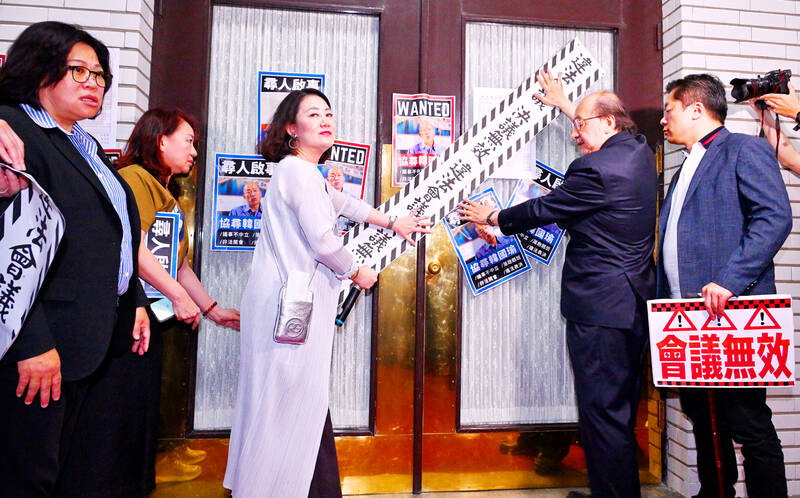Legislative Speaker Han Kuo-yu (韓國瑜) was confronted by Democratic Progressive Party (DPP) legislators yesterday over allegedly using illegitimate means to push a referendum bill to a second reading without committee review.
DPP caucus chief executive Rosalia Wu (吳思瑤) said that proper legislative procedures were not followed and therefore the motion should be declared invalid.
The bill contains two KMT proposals to hold a referendum on “opposing the imposition of martial law” and “opposing the abolition of the death penalty.”

Photo: Liu Hsin-de, Taipei Times
Wu said the Chinese Nationalist Party (KMT) and Taiwan People’s Party (TPP) conducted a “nighttime raid” on Tuesday, along with other illegitimate actions.
Due to the “raid,” DPP legislators have continued to hold a sit-in for a second day in a row, guarding the front entrance of the legislative chamber.
“We are protecting Taiwan’s democracy and upholding the rules to prevent the KMT and the TPP from carrying out another secret vote,” Wu said.
Wu yesterday afternoon led DPP legislators to confront Han, handing him an official complaint to request a probe by the legislature’s Discipline Committee of contraventions surrounding the bill’s approval.
The complaint cited allegedly unauthorized maneuvers by KMT caucus whip Fu Kun-chi (傅?萁) and TPP Chairman Huang Kuo-chang (黃國昌), and pointed to wrongful actions by Legislative Yuan Secretary-General Chou Wan-lai (周萬來).
“We received the meeting notice from legislature’s secretariat, as is the normal procedure, which provided the agreed-upon meeting agenda for Tuesday, March 25, and listed the meeting time as from 9am to 6pm,” DPP caucus whip Ker Chien-ming (柯建銘) told reporters.
It also listed under the “legislative procedure” that the speaker could extend the meeting when nearing adjournment, but the speaker must request consent from the legislators present, Ker said.
“When it was nearing 6pm on Tuesday, Han was not in attendance, and he did not enter to request to extend the day’s meeting... Therefore we all assumed the day’s meeting was adjourned at 6pm, as legislators of all main parties departed from the chamber,” Ker added.
“Unbeknown to the DPP, legislators of opposition parties carried out a ‘nighttime raid,’ convening an unauthorized session and conducting an illegitimate vote to approve the referendum bills for a second reading,” Ker said.
The KMT and TPP contravened procedures by convening the meeting outside listed times, Ker said.
“These are lawmakers elected to serve the people, as they know the proper procedures, but knowingly break them, and have contravened the regular rules, and have tarnished the integrity of the Legislative Yuan,” Ker told a news conference in front of the legislature yesterday evening as the party continued to guard the entrance ahead of today’s session, as the opposition are expected to ram the bill through a third reading.
Ker and Wu demanded a probe by the Discipline Committee, saying that Chou and staff at the session breached provisions on upholding impartiality and official rules under the Public Functionary Service Act (公務員服務法), and hence should be investigated by public prosecutors.
The “opposing the abolition of the death penalty” referendum would ask voters: “Do you agree with the policy that judges in appellate courts do not need unanimous agreement to sentence a defendant to the death penalty?”
The “opposing martial law” referendum would ask: “Do you agree the government should avoid war and prevent Taiwan from becoming a place of martial law, where youth die and homes are destroyed, as in Ukraine?”

The Ministry of Economic Affairs has fined Taobao NT$1.2 million (US$36,912) for advertisements that exceed its approved business scope, requiring the Chinese e-commerce platform to make corrections in the first half of this year or its license may be revoked. Lawmakers have called for stricter enforcement of Chinese e-commerce platforms and measures to prevent China from laundering its goods through Taiwan in response to US President Donald Trump’s heavy tariffs on China. The Legislative Yuan’s Finance Committee met today to discuss policies to prevent China from dumping goods in Taiwan, inviting government agencies to report. Democratic Progressive Party Legislator Kuo Kuo-wen (郭國文) said

The Ministry of Economic Affairs has fined Taobao NT$1.2 million (US$36,900) for advertisements that exceeded its approved business scope and ordered the Chinese e-commerce platform to make corrections in the first half of this year or its license would be revoked. Lawmakers have called for stricter supervision of Chinese e-commerce platforms and more stringent measures to prevent China from laundering its goods through Taiwan as US President Donald Trump’s administration cracks down on origin laundering. The legislature’s Finance Committee yesterday met to discuss policies to prevent China from dumping goods in Taiwan, inviting government agencies to report on the matter. Democratic Progressive Party

Taiwan and its Pacific ally Tuvalu on Tuesday signed two accords aimed at facilitating bilateral cooperation on labor affairs, according to Taiwan’s Ministry of Foreign Affairs (MOFA). The governments inked two agreements in Taipei, witnessed by Foreign Minister Lin Chia-lung (林佳龍) and visiting Deputy Tuvaluan Prime Minister Panapasi Nelesone, MOFA said in a news release. According to MOFA, the agreements will facilitate cooperation on labor issues and allow the two sides to mutually recognize seafarers’ certificates and related training. Taiwan would also continue to collaborate with Tuvalu across various fields to promote economic prosperity as well as the well-being of their

Sung Chien-liang (宋建樑), who led efforts to recall Democratic Progressive Party (DPP) Legislator Lee Kun-cheng (李坤城), was released on bail of NT$80,000 today amid outcry over his decision to wear a Nazi armband to questioning the night before. Sung arrived at the New Taipei District Prosecutors’ Office for questioning in a recall petition forgery case last night wearing a red armband bearing a swastika, carrying a copy of Adolf Hitler’s Mein Kampf and giving a Nazi salute. Sung left the building at 1:15am without the armband and covering the book with his coat. Lee said today that this is a serious